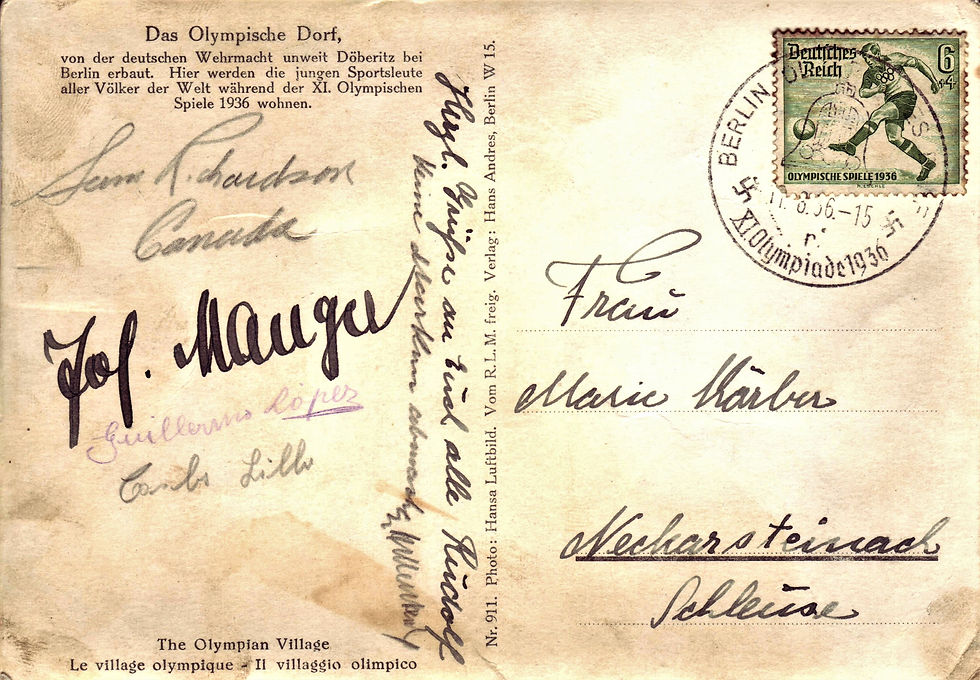Genocide Games?
- Karl Koerber
- Dec 7, 2021
- 4 min read
Updated: Nov 18, 2022

Beijing 2022 vs Berlin 1936
The World Uyghur Council has labelled the upcoming 2022 Winter Olympics in China the “Genocide Games,” in protest of the Chinese government's policy of forced assimilation of the country's Uyghur ethnic minority. China’s blatant abuse of human rights and repression of dissent has, in fact, prompted over 180 organizations to call on governments around the world to boycott the Games.
This brings to mind a similar boycott movement in the run-up to the 1936 Summer Olympics in Berlin in response to the Nazis’ persecution of Jews and other minorities. In Germany’s case, the boycott very nearly came off. The movement was primarily centred in the United States, with some powerful advocates on both sides of the debate.
Jeremiah Mahoney, president of the American Amateur Athletic Union, was one of the main proponents of the boycott, contending that participation would amount to an endorsement of Hitler’s regime and its antisemitic policies. The president of the American Olympic Committee, Avery Brundage, favoured participation in the games and argued that politics had no place in sport, claiming that: "The Olympic Games belong to the athletes and not to the politicians." Another boycott supporter, Ernst Lee Jahncke, was actually expelled from the International Olympic Committee (IOC), apparently in response to his public opposition to American participation. He was the only member ever to be expelled in the 100-year history of the IOC.
The arguments for and against a boycott are not much different today than they were in 1935 and ’36. While today's coalition of pro-boycott campaigners believes a boycott of the Games would help to "ensure they are not used to embolden the Chinese government's appalling rights abuses and crackdowns on dissent," Canada’s Dick Pound, the longest serving member of the IOC, claims a boycott would be "a gesture that we know will have no impact whatsoever."
In the case of the 1936 Berlin Games, the American Athletic Union, in a close vote, ultimately elected to participate and send a team to the Games, after which most other countries fell into line.

My own family history has a connection to the 1936 Berlin Olympics. My paternal grandfather Rudolf, pictured on the right above, and his brother Theodor attended the Games. In this photo they are standing at the doorway to one of the bungalows in the athletes' village.


Rudolf sent this postcard of the athletes' village back home to Neckarsteinach, the town where I was born thirteen years later. The autographs include that of Team Canada's Sam Richardson, who competed in the long jump and men's 4x100 relay, where the Canadians placed 4th and the American team, anchored by the great Jesse Owens, won the gold medal. The other autographs are from the German gold medalist weight-lifter Josef Manger and two boxers from my Uncle Theodor's adopted homeland of Chile.

This is a portion of a souvenir sheet of special postage stamps created for the Berlin Games. Rudolf purchased it as a gift for my father, who later gave it to me. The stamps are cancelled with the official postmark of the Olympic Village.
For the duration of the Berlin Games, the Nazis paused their antisemitic program and presented a facade of tolerance to the outside world. Hitler had also gone to great lengths and expense to outdo previous Olympic hosts, constructing a new 100,000 seat track and field stadium as well as multiple other venues, including the Athletes' Village. The Berlin Games were also the first to be televised, and the first to feature the torch relay from Greece to the host city. The cinematically groundbreaking film Olympia, by Leni Riefenstahl, remains a captivating documentation of the Games.
Despite the controversy and opposition to the Nazis' antisemitic agenda, the Berlin Olympics turned out to be a resounding success, and certainly improved the Nazis’ image in the wider world. Would a boycott have made a difference to the ultimate cataclysm that unfolded? I doubt it. I'm not a big fan of Dick Pound, but I suspect that, in this instance, he may be right: a boycott of a sports event, unlike an actual trade embargo or economic sanctions, is a gesture that is unlikely to trigger a change of heart in the targeted country.
Nations, especially powerful ones like China and Nazi Germany, will set their own agendas and the options for outsiders to influence policy in any meaningful way are very limited. Military intervention, as evidenced in recent history by the disastrous attempts by the USA and its allies to “fix” the problems (many of which the Americans helped to create in the first place) in places such as Iraq, Libya and Afghanistan, rarely produce the intended outcome. The latest debacle in Afghanistan is just one more example of the sad truth that change cannot be forced and there are no miracle cures for the injustice and suffering that permeates so much of humanity.
Do the Olympic Games have any relevance at all in the big picture of global politics? Very little, I would suggest. The fact of almost every country on the planet taking part in this enormous sporting event might help to foster the concept of a global family of nations, I suppose, or, at least, provide a fleeting glimpse of what world harmony could look like. Take away the excess, the hype, the glitz, the massive marketing campaigns, and what’s left is a big party where, at the end of the day, people leave with a warm glow and the sense that they are part of a greater whole. It’s not much, but I guess it’s something.




Comments